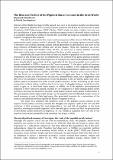Files in this item
The rise and decline of the populist social contract in the Arab world
Item metadata
| dc.contributor.author | Hinnebusch, Raymond | |
| dc.date.accessioned | 2021-08-29T23:37:09Z | |
| dc.date.available | 2021-08-29T23:37:09Z | |
| dc.date.issued | 2020-05 | |
| dc.identifier | 260582250 | |
| dc.identifier | ec035093-2221-4e1a-8c1d-e5dcaccfd7d0 | |
| dc.identifier | 85071443175 | |
| dc.identifier | 000519652400036 | |
| dc.identifier.citation | Hinnebusch , R 2020 , ' The rise and decline of the populist social contract in the Arab world ' , World Development , vol. 129 , 104661 . https://doi.org/10.1016/j.worlddev.2019.104661 | en |
| dc.identifier.issn | 0305-750X | |
| dc.identifier.other | ORCID: /0000-0001-5800-6606/work/61369940 | |
| dc.identifier.uri | https://hdl.handle.net/10023/23861 | |
| dc.description.abstract | The wave of populist authoritarian republics (PA) established in the Arab world in the 1950s–1960s legitimized themselves by a combination of nationalism, developmentalism and populism. Their reneging on this contract goes far to explaining the Arab Uprisings half a century later. PA regimes, with initially little popular support, needed, as part of their struggle to consolidate power at the expense of the old oligarchy and other rivals, to incorporate the middle and lower classes into a cross-class coalition. They developed a tacit populist social contract in which their putative constituencies were offered social-economic benefits in return for political support; this accorded with the inherited moral economy of the region in which government legitimacy was conditional on its delivery of socio-economic equity and justice. Additionally, however, authoritarian populism was made possible by developments at the global level such as bi-polarity, which enabled political protection and economic assistance from the Soviet bloc, and the developmentalist ideology that corresponded with the Keynesian era of global economic expansion in which the power of finance capital was balanced by labour and the regulatory state. However, by the eighties, Keysianism had been superseded by neo-liberalism, driven by the restoration of the global dominance of chiefly Anglo-American finance capital. This global turn was paralleled by the exhaustion of the statist-populist development model in MENA. The demands made on MENA governments by international financial institutions for privatization were used by regime elites to foster crony capitalism as they and their cronies acquired public sector assets; in parallel pressures for structural adjustment legitimized enforcing austerity on the masses: in essence regimes started to renege on the populist social contract. The Arab Uprising was a direct consequence of this. Evidence for this claim is adduced from public opinion polling, the timing of the uprising and the especial vulnerability of the region’s republics to the uprising. | |
| dc.format.extent | 273478 | |
| dc.language.iso | eng | |
| dc.relation.ispartof | World Development | en |
| dc.subject | Social contract | en |
| dc.subject | Populism | en |
| dc.subject | Authoritarianism | en |
| dc.subject | Political economy | en |
| dc.subject | Arab Uprising | en |
| dc.subject | Globalization | en |
| dc.subject | HN Social history and conditions. Social problems. Social reform | en |
| dc.subject | JZ International relations | en |
| dc.subject | T-NDAS | en |
| dc.subject | BDC | en |
| dc.subject | R2C | en |
| dc.subject.lcc | HN | en |
| dc.subject.lcc | JZ | en |
| dc.title | The rise and decline of the populist social contract in the Arab world | en |
| dc.type | Journal article | en |
| dc.contributor.institution | University of St Andrews. School of International Relations | en |
| dc.identifier.doi | 10.1016/j.worlddev.2019.104661 | |
| dc.description.status | Peer reviewed | en |
| dc.date.embargoedUntil | 2021-08-30 |
This item appears in the following Collection(s)
Items in the St Andrews Research Repository are protected by copyright, with all rights reserved, unless otherwise indicated.

